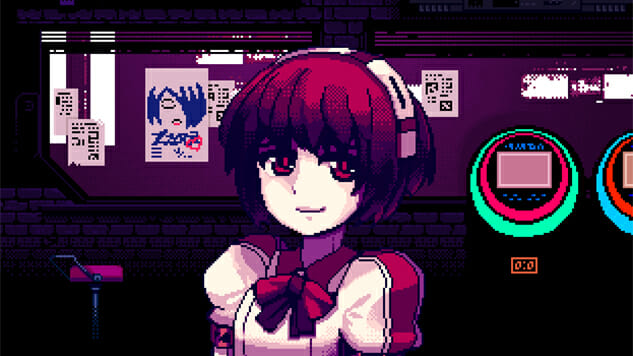VA-11 HALL-A Accurately Reflects the Dystopian Hell of the Service Industry
Games Features VA-11 HALL-A
If you’ve ever worked in the service industry, but especially if you’ve been a bartender, then you’re familiar with a certain sense of feeling trapped. When your job bears even the slightest expectation of professional hospitality, you’re at the mercy of whoever walks in the door. With so many different kinds of people to serve, you become something of a chameleon, changing personalities with each new person who approaches the bar. Spend enough time in the profession, and the unpredictable becomes mundane and the mundane unpredictable, setting you adrift in a bizarre void where nothing and everything shocks you all at once. For the majority of your day, or at least your work shift, you abide in a purgatory divorced from the rules of a conventional social contract. It’s a world that exists on a plane of its own.
Lately, I’ve been playing VA-11 HALL-A, a cyberpunk bartender game that takes place in a small dive bar in the dystopian Glitch City. As Jill, you spend late nights serving drinks and holding long conversations with a gnarly assortment of customers, figuring out what they’d like to imbibe based on details from the exchange. The bartending part itself is more fiction than fact; the cocktails and ingredients have invented names, and there’s almost no penalty for mistakes. But despite the liberties it takes with the process, there’s an element of art and intuition. It accurately mirrors the delicate social dance of the profession and its fleeting moments of fulfilling creative expression. On some level, VA-11 HALL-A seems to know it’s a thankless job but one that lets you be thoughtful in a quiet, self-fulfilling way.
It’s remarkable that, despite not really being about mixing cocktails, VA-11 HALL-A recreates the feeling of being a bartender pretty well. Sometimes the best part of your shift is when the customer stops finally talking, and you get to improvise something to their tastes (even though you know they won’t appreciate it). The game also has a firm grasp on the type of customers one deals with as a server. There are the people who foist their personality on you for the duration of their drink, demanding your company but never hearing a word you say. There are the over-familiar patrons who try to establish themselves as regulars within a single visit. The ones that, no matter how perfect their drink is, can never be pleased. There’s that flinch and sense of dread as you see a new person approach, wondering what fresh hell the next twenty minutes will bring.
And then there are the lovely people, the ones who know how to hold a conversation in those fleeting moments you have to spare between drinks. The ones who know how to hold court without taking you away from other customers. The folks who don’t insist you entertain them or order you around like a servant, who are just trying to relax and be on their way. While the friendlier relationships are still superficial, they have a certain symbiosis to them, and over time you come to appreciate the exchange, meaningless though it may be. It’s a mixed bag of experiences that puts you on high alert with every new person that approaches. But it makes the sweet moments all the sweeter.
Interestingly enough, the game doesn’t just mirror the feeling of tending bar through its narrative structure. As the player, I felt put on the spot by the developers. For example, in one scene, the bartender Jill is cornered by a newspaper editor who rants about “SoCal Justice Warriors,” a spoof term that doesn’t necessarily shed light on the game’s worldview. I felt pinned, both by my inability to leave the conversation and my uncertainty of the writer’s intent. Later I met Dorothy, a robot sex worker who openly confessed to using her childlike appearance to make more money off her customers, a scene that similarly didn’t make its politics known. It is hard not only to figure out where the characters are coming from, but where the writers are coming from too. All you can do is endure the conversation as best as you can, realize “it takes all kinds,” and concede that all kinds need a place to drink. It’s a grim concession but one that works on both levels.
I would have loved to use this article to reminisce on the dignity of the bartending profession and how it provides a service to lonely people who just need a sympathetic ear. But that would be romanticizing both VA-11 HALL-A and bartending itself. It’s not all glasses of wine in dimly lit tapas bars and giving out advice like an English trained butler. It’s more about having to be a good sport and a great conversationalist even when you’re on the last hour of your shift and tired as hell. Despite the faux ingredients and neon pixel cyberpunk sensibilities of VA-11 HALL-A, there are many things about the game more realistic than not, especially its themes of finding slim moments of hope and joy in an otherwise cheerless existence. But especially, it nails that feeling of serving cocktails while you could really use a drink.
Holly Green is the assistant editor of Paste Games and a reporter and semiprofessional photographer. She is also the author of Fry Scores: An Unofficial Guide To Video Game Grub. You can find her work at Gamasutra, Polygon, Unwinnable, and other videogame news publications.